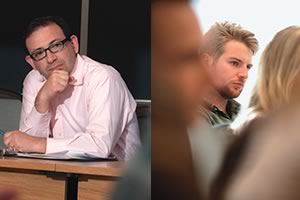A seminar focuses on fighting transnational bribery
Twenty law students take their seats in a third-floor seminar room of Wasserstein Hall, and their professors get right down to business. How do we evaluate claims made in the literature about the impact of the Foreign Corrupt Practices Act on U.S. businesses and U.S. leadership around the world? Instantly, a student ventures that broad anti-corruption efforts might help the U.S. economy, even if the benefits to particular firms are unclear.
For the next two hours, the air crackles with refutations, clarifications, elaborations, insights and reality checks. The break that’s scheduled at the one-hour mark comes 15 minutes late because the students are too engaged to stop.
Welcome to Combating Transnational Bribery. It’s a new seminar taught by Professors Jack Goldsmith, an international law expert with insider knowledge of the workings of the U.S. Department of Justice, and Matthew Stephenson ’03, a scholar in law and political economy, with a keen interest in anti-corruption.

The students come from a range of backgrounds. Some are experienced in international development work; others spent time before law school on FCPA matters at the Justice Department, the U.S. Securities and Exchange Commission, or private firms. Several are LL.M. candidates from abroad with anti-corruption experience from their own countries.
“It’s a very smart and very informed group of people who are all learning from each other,” says Goldsmith.
And it’s not just the students who are learning. David Donatti ’15, who is interested in the intersection of civil law, litigation, and international law, says of Goldsmith and Stephenson: “Sometimes it feels like they’re professors, and sometimes it feels like they are active participants, just other students in the class.”
Anti-corruption is a large and growing area of legal practice. FCPA enforcement actions have risen considerably since the early 2000s, and the stakes are high—fines and penalties can soar into the hundreds of millions of dollars. Corruption affects the entire international community and is a major challenge in global development. “The FCPA is important and only gaining in importance as the Department of Justice and the Securities and Exchange Commission push for harder enforcement of the provisions,” says Stephanie Freudenberg ’15, who is considering a private-sector career in white-collar investigations.

The FCPA also provides a platform for studying prosecutorial discretion, multijurisdictional legal matters and how law affects business practices. A course highlight is the impressive lineup of guest speakers—practitioners from the public, private and international sectors—who bring their real-world experience to bear. The goal, Stephenson says, is to “give students a sense of what lawyers who deal with the FCPA, or similar issues, deal with in practice, as well as exposing them to a diverse range of views.”
Jordan Moran ’15, a student in the seminar who spent three years with the Justice Department’s FCPA unit, has a new appreciation for the complexity of fighting international corruption. One dilemma that the seminar has helped him see is that enforcement of the FCPA can deter companies from doing business in countries that need reform the most. “Everything we do in terms of enforcing and/or amending the FCPA must be considered in light of the foreign policy origins and the foreign policy implications,” he says. “Oftentimes, they are at cross-purposes, and that makes it a very, very difficult area of law.”
